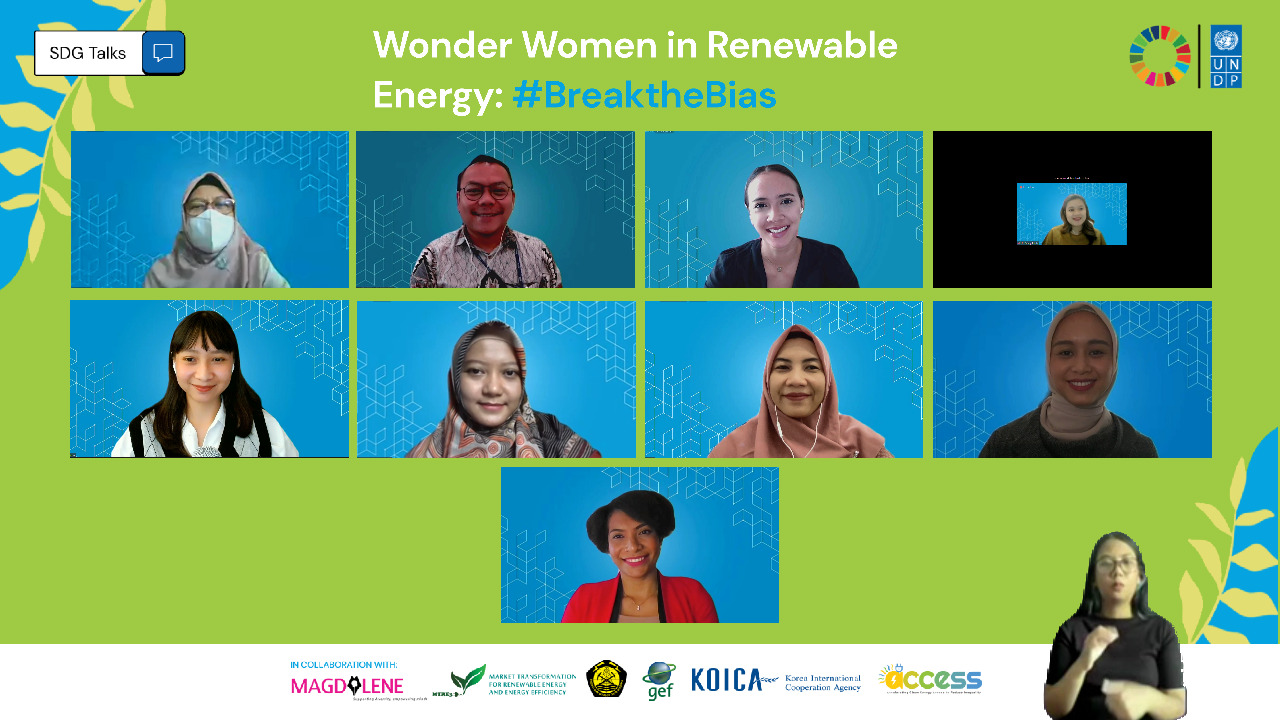As Indonesia ramps up efforts to transition to a green economy, our most recent edition of SDG Talks paid tribute to the unsung female heroes of the country's renewable energy sector, a small but significant group in a vital area for achieving the SDGs.
Speakers from UNDP’s Accelerating Clean Energy Access to Reduce Inequality (ACCESS) project and the Mitigating Actions in the Energy Sector (MTRE3) were on the panel as were representatives from our key donor, the Korea International Cooperation Agency (KOICA) and government partners, including state-owned airport operator, PT Angkasa Pura I.
Ms. Andriah Feby Misna, the Director of Various Energy & Renewable Energy, at the Ministry of Energy and Mineral Resources said more needs to be done to breakdown the bias against women in male-dominated renewable energy sector.
“We hope that there will no more stereotypes attaching to women to choose their future aspirations, including in the energy sector. It is critical that from the beginning of our strategy to eradicate poverty and empower society, that we must apply gender equality as one of the components”.
Mr. Nikka Sasongko, Program Manager KOICA Indonesia echoed the importance of gender inclusion.
“Gender equality is a universal approach and essential to fully accomplish the SDG, and KOICA has set up the gender equality midterm strategy to achieve the goal to empower women and to promote women participation in response to climate action and disaster risk reduction,” he said.
During the discussion, five panelists, Nadine Alexandra Dewi, an actor and environmental enthusiast, Fanny Evrita, Entrepreneur and co-founder of Thisable Beauty Care, Karina Pravitasari, Airport planning and Project Development Specialist at PT Angkasa Pura I, Nila Murti, Working Group Coordinator at UNDP’s MTRE3 Project, and Imas Agustina, Technical Officer at UNDP’s ACCESS Project, shared their enthusiasm and encouragement to hundreds of participants joining through webinar session Moderated by local news anchor Yuliana Fonataba.
Indonesia still has a long way to go to accomplish its goal of 23% renewable energy utilization by 2025, despite reaching 11 percent by 2020. Involving more opportunities for women in renewable energy sector can help Indonesia achieve the goal.
Karina Pravitasari noted her experience becoming one of the very few certified “energy manager” Indonesia, where make up women up only four percent of the sector.
“The needs of businesses to provide energy management service creates demands for energy managers, which surprisingly has very low percentage of women’s managers. I am thrilled because now I am running as an energy manager, thanks to the Srikandi Training conducted by UNDP, I am supporting Angkasa Pura Airports to implement the ISO 50001 to save energy,” She said referring to the management industrial standard certificate.
Women play important role, especially on measuring and monitoring the use of energy in their homes and in many cases, throughout the communities at large. UNDP’s ACCESS Project used the approach to train women village technicians to maintain the communal solar panel built in their villages.
Imas Agustina said in the beginning, many of the women apprentice technicians lacked the self-confidence to carry out their responsibilities at first.
“There are challenges, especially when the maintenance requires both men and woman technician from the communities. Some women felt they were not qualified enough and not being confident of performing such duties. However, by doing so, we then equip the locals with proper trainings and assistance to create the confidence and their skills.”
Nila Murti, the Working Group Coordinator of UNDP’s MTRE3 project highlighted the importance of more trainings on women to break gender bias in energy sector. She singled out the Srikandi training program, organized by the MTR3 project, as one specific initiative that boost the knowledge and self-confidence of female renewable energy managers.
“The recent Srikandi Energy Manager training has proven that if we open the possibilities and access, we will see more women playing their roles in the energy sector. I encourage the young people to remember that whatever roles and changes you created, it will also make a difference.”
Entrepreneur and co-founder of Thisable Beauty Care, Fanny Evrita, pointed the needs of productivity and innovation to implement SDG’s Leave No One Behind commitment, particularly for the disabled communities.
”By opening more access in digital transformation, that can be created through creating more infrastructures in electricity, will help more disabled communities in secluded areas to be productive and gain more skills.”
She went on to say that the double burden that women with disabilities bears may be addressed by developing a more inclusive business line approach to the disabled communities.
Indonesian actress, Nadine Alexandra Dewi, said the women in Indonesia’s renewable energy sector serve as role models for young women and girls seeking to establish a career in Science, Technology, Engineering and Math (STEM).
“The panel discussion features many examples of women in STEM, I I am confident that more women will play a larger part in Indonesia's shift to renewable energy”
-
Written By Enggi Dewanti
Edited by Tomi Soetjipto and Ranjit Jose

 Locations
Locations
